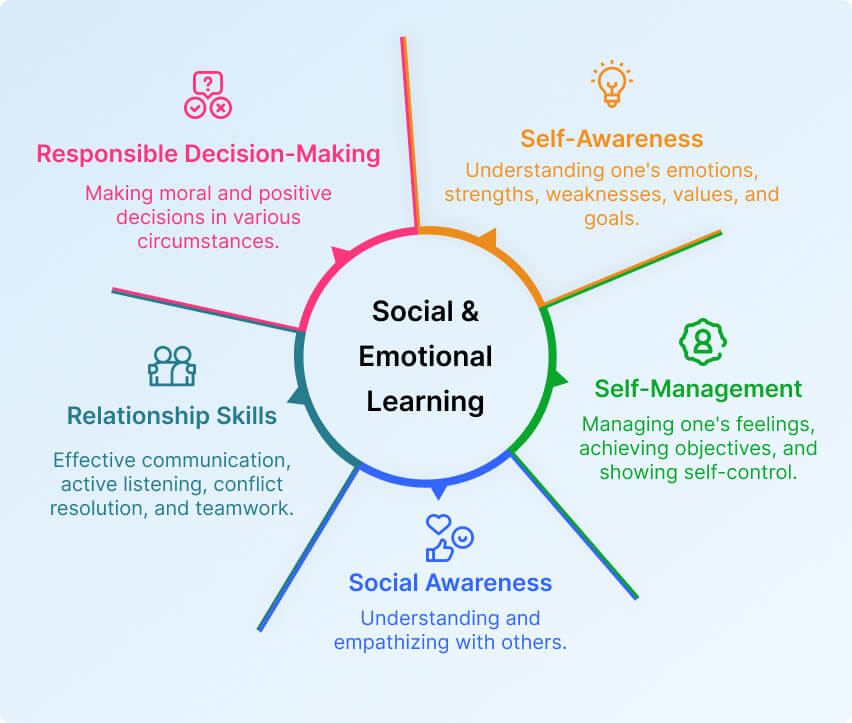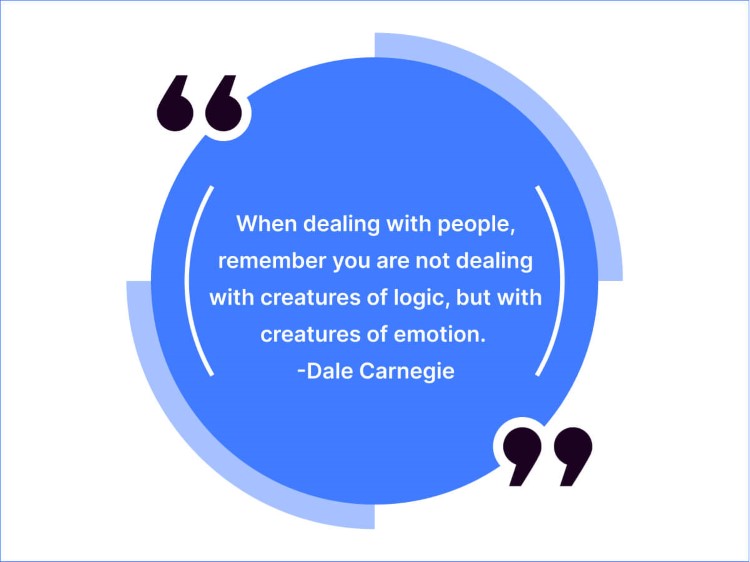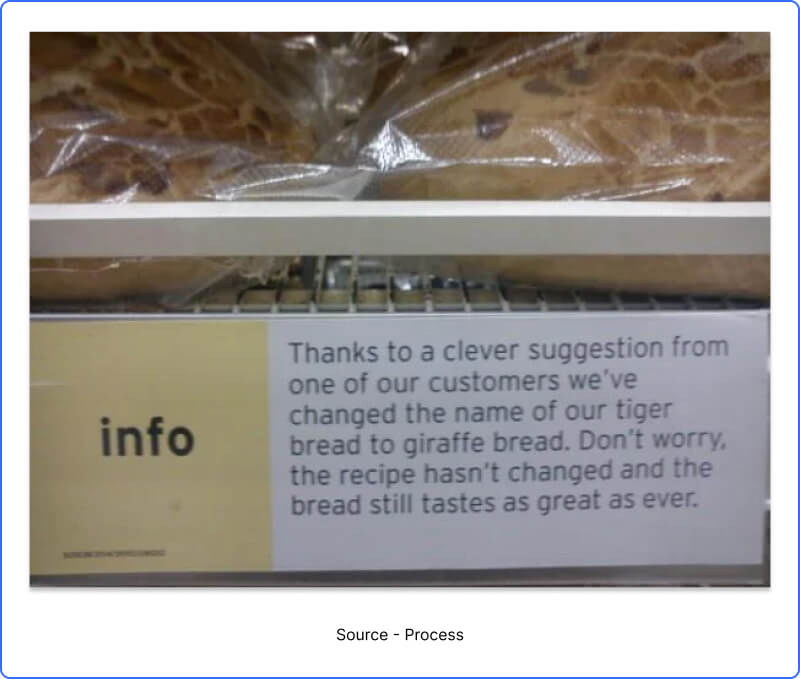Customer Service Redefined: The Role of Emotional Intelligence
- October 19, 2023
- 15 mins read
- Listen

Table of Content
Many brands prioritize rational elements that influence consumer behavior, like pricing and product attributes. However, in today’s market, customers increasingly make buying choices driven by their emotional connections.
Recognizing and embracing the emotional aspects of the customer’s experience is essential for fostering customer engagement and brand loyalty. These factors, in turn, can significantly enhance sales, revenue, and return on investment (ROI).
In accordance with a research paper by TalentSmart, it has been found that the top-performing customer service personnel also rank as the highest scorers in terms of emotional intelligence.
Emotional intelligence has the potential to revolutionize your customer experience by providing profound insights into the thought processes and behaviors of your customers. Every customer interaction holds significant importance in shaping your brand’s image. Are your customers sensing authenticity, empathy, and helpfulness in their conversations and interactions with your customer support teams? If not, how can you provide training to your customer support teams to enhance their awareness of language, tone, and procedures, thereby upholding customer trust?
In this guide, I will elucidate the concept of emotional intelligence and illustrate how you can leverage it to surpass customer expectations and achieve revenue targets.
Defining Emotional Intelligence
Emotional intelligence encompasses the capacity to recognize and manage our own emotions, comprehend the emotions of others, and interact empathetically in a suitable manner. It involves the utilization of skills such as self-awareness, self-regulation, intrinsic motivation, empathy, and interpersonal skills to effectively communicate with individuals, identify their emotions, and potentially impact them.
Within the domain of emotional intelligence and customer service, it involves upholding a calm and collected manner while serving as the customer’s primary interface. This entails allowing them to articulate their concerns without interruptions and going the extra mile to deliver comprehensive solutions to their questions. Enhanced emotional intelligence within customer service teams translates into adeptly guiding the dialogue, creating an atmosphere of tranquility and authority, and ultimately aiding customers in uncovering the most optimal resolutions.
Emotional intelligence is categorized into five distinct components:
1. Self-Awareness
It involves understanding the influence of your speech patterns, word selection, and tone on others. In customer service interactions, being conscious of how you communicate with customers is crucial to prevent causing frustration or effectively handling a particularly agitated customer.
2. Self-Regulation
Self-regulation pertains to your ability to manage your reactions when responding to someone else’s communication. In the context of customer service, this typically entails maintaining composure, employing a measured pace of speech, and smoothly adjusting to unexpected circumstances as they unfold in the course of an interaction.
3. Intrinsic Motivation
Internal motivation pertains to the mindset you bring into conversations. Exceptional customer service professionals have a clear understanding of the purpose behind their work, exhibit unwavering dedication to their own growth, their organization, and the satisfaction of customers, and generally maintain a positive outlook regarding their roles.
4. Empathy
Empathy involves comprehending and authentically addressing the emotions of others in order to create trust. Customer service teams staffed with empathetic representatives are more effective in mitigating and resolving customer frustration by carefully selecting their words and tone.
5. Social Skills
It involves integrating all of the previously mentioned four emotional intelligence skills and applying them to guide their interactions with others. By undergoing various training sessions and shaping their abilities through practice, individuals can acquire the skills needed to become exemplary representatives of your company brand, showcasing positive emotional intelligence.
When dealing with a customer who displays stubbornness or rudeness, remember that there are underlying reasons for his behavior. Particularly in these challenging times, when individuals are grappling with their own anxieties (in situations akin to the fight-or-flight response), it’s important to recognize that you may not be aware of the stressors affecting the person you are currently interacting with.
Conversations can take various directions, but the responsibility lies with you to manage your responses. Always bear in mind that, ultimately, every customer simply desires to be listened to and comprehended. Exercise control over your reactions to their emotions by directing your thoughts. Maintain your composure, take slow, deep breaths, and remember that your primary role is to listen rather than react.
Why Emotional Intelligence Matters in Customer Service Interactions?
A study conducted in 1997 at a prominent insurance company revealed that sales agents possessing high emotional intelligence were able to sell policies with an average premium of $114,000, nearly twice as much as their counterparts with lower emotional intelligence.
In the same way customer service teams that possess strong emotional intelligence frequently nurture more favorable customer service interactions. In the end, good customer service revolves around both managing relationships and resolving issues, and there is a significant emotional element involved for customers.
The importance of emotional intelligence in customer service is profound and it can yield the following advantages for your company:
-
Boost Customer Retention and Recommendation
When your customer service representatives provide a positive experience, it enhances the likelihood of customers remaining loyal to your brand and recommending it to others. Delighting your customers greatly contributes to building and sustaining their loyalty.
-
Enhance Job Satisfaction for Customer Support Agents
Equipping your customer service reps with emotional intelligence training not only makes them more productive but also increase their motivation to excel in ensuring customer satisfaction. These customer service skills often result in more consistently positive customer feedback, further boosting the team’s motivation.
-
Enhance Customer Loyalty
It’s important to note that a single negative experience can prompt 72% of customers to switch to another brand. Therefore, consistently establishing positive connections, even when dealing with challenging or demanding customers, enables your support teams to cultivate positive emotional states and reinforce customer expectations and trust in your brand.
-
Stimulate Sales Growth
When your customer support team is recognized for their proficiency in delivering exceptional customer service, it has a significant impact on your ability to not only retain existing customers but also attract new ones. Positive customer service experiences build a strong reputation for your company, and satisfied customers are more likely to become loyal patrons.
Moreover, the positive word-of-mouth and referrals generated by satisfied customers can lead to increased sales as new clients are drawn to your business, enticed by the prospect of receiving top-notch service. This heightened trust and reputation in the market can drive significant revenue growth and business success.
According to a survey conducted in 2022 involving over 9,000 U.S. consumers by Qualtrics, it was revealed that a customer’s emotions play the most significant role in influencing their loyalty as consumers. The study found that customers who had a positive experience were almost five times more inclined to trust the company and make additional purchases compared to those who had a negative experience.
Mastering Customer Service Excellence Through Emotional Intelligence
Equipping your customer service team with essential emotional intelligence skills necessitates a combination of educational training and hands-on experience. Emotional empathy may not be an inherent trait for everyone, so it’s crucial that if a team member lacks this skill, you offer workshops and opportunities to develop empathy relevant to his role. With consistent practice and effort, anyone can master the skills required for elevated emotional intelligence.
Addressing poor customer service can be approached in several ways, and we’d like to spotlight a few strategies connected to emotional intelligence in customer service. Let’s deep dive.
It Begins with You!
Right at the outset of your journey, one of the most crucial aspects is to ensure that your emotional intelligence is at its best. You must actively put into practice what you aim to advocate. It’s not about taking significant leaps but about taking numerous small steps…
Here are some recommendations to assist you in incorporating emotional intelligence into your daily life:
1. Acknowledge Your Emotions
While it may require some practice, make an effort to frequently inquire, “What is my current emotional state?” Your response could encompass emotions such as happiness, sadness, irritability, or even “hangry” (a blend of hunger and anger). Nevertheless, it’s crucial to tune into your emotional state. Once you start identifying your emotions, you can start to gain insights into the reasons behind your reactions and subsequently take measures to improve how you manage them.
2. Show Self-Compassion
One significant error to avoid is categorizing emotions as either “positive” or “negative.” In the realm of emotional intelligence, such distinctions are irrelevant and can divert your focus from effectively handling them.
In truth, emotions are simply emotions. What truly matters is the manner in which you opt to handle and respond to them, as this is where the true impact lies.
3. Engage in Breathing Exercises
An effective method to interrupt the hustle and bustle of your day, filter out distractions, and attune to your emotional state is by engaging in breathing exercises. Furthermore, this practice can offer short-term stress management benefits.
Numerous breathing exercises are readily available online, including platforms like YouTube, so take some time to explore and discover an exercise that aligns with your preferences. You can even establish a smartphone alarm to prompt you to pause and engage in your chosen exercises. Over time, this practice is likely to become a natural part of your routine.
4. Embrace a Mindful Stroll
Have you ever gone for a walk recently where you didn’t ponder your to-do list, engage in phone conversations, or constantly check messages? If, like many individuals, you often find yourself multitasking, consider attempting a “mindful walk” instead.
By disconnecting from technology and immersing yourself in the sounds and scents of your surroundings, you can attain mental clarity. This allows you to become more attuned to the environment and your own emotions. While it may require some practice, if you notice your mind starts to drift, just gently redirect your focus without passing judgment.
5. Incorporate Moments of Silence in Your Daily Routine
Were you aware that silence has the capacity to rejuvenate the nervous system and promote mental adaptability? Furthermore, it’s linked to the generation of new cells in the hippocampus. If possible, endeavor to incorporate a 5-minute period of silence into your daily routine. You can even utilize an alarm as a reminder to ensure you accomplish this daily moment of tranquility.
6. Opt for Thoughtful Responses Instead of Impulsive Reactions
An integral aspect of nurturing emotional intelligence involves not letting your emotions dictate your actions. Cultivate a sense of curiosity regarding the emotions that surface within you. Consider maintaining a journal to document your feelings and explore the reasons behind them. Even brief notes can have a significant impact on your self-awareness and emotional intelligence.
Shift your attention towards what you can actively influence. For instance, if you identify a recurring pattern of frustration following team meetings, take a step back. Consider incorporating pre-meeting breathing exercises to help you relax and approach the situation with a clearer perspective.
Enhancing Emotional Intelligence Across Your Customer Service Team
Once you’ve begun to acknowledge and excel in emotional intelligence on a personal level, it’s the moment to propagate these principles within your team. In this segment, I will provide some suggestions and guidance for developing a corporate culture that actively nurtures emotional intelligence.
7. Promote a Culture of Emotional Openness Among Agents
Make an effort to create a culture that encourages and supports your team members in openly expressing their emotions. This often begins with you leading by example, sharing your own feelings openly, and then asking questions and actively listening when they choose to confide in you, all without passing judgment.
Such consistent practice of this nature can play a significant role in establishing a secure environment, facilitating improved comprehension, and ultimately enhancing communication across the board.
8. Instruct Agents to Take Pause and Reflect Prior to Addressing Customer Inquiries
In training sessions, prompt your customer support team members to put themselves in the shoes of the person making a request and think about how they would like others to feel, respond, or communicate with them in that scenario. This approach shows empathy and helps participants understand the perspective of the person making the request.
9. Commence Each Shift with a Check-In for All Agents
Incorporate the practice of checking in with each team member at the beginning of their shift as a routine. This allows you to assess their emotional state for the day, especially if they’ve had a stressful morning. Subsequently, you can take proactive steps to positively influence their performance and customer interactions, even if it entails affording them some time to engage in conversation and recharge while enjoying a cup of tea.
10. Integrate Emotional Intelligence Training into Your Onboarding Procedure
At what point should you initiate the cultivation of emotional intelligence? My perspective has consistently been that the earlier, the more advantageous. You should implement emotional intelligence training as part of the onboarding process, with subsequent follow-ups at intervals to identify areas where agents may require further assistance.
11. Exchange and Disseminate Best Practices Among the Team
Always maintain a strong focus on emotional intelligence by regularly sharing real-life examples with your entire team. When feasible, you can record and playback these examples. This approach is aimed at ensuring that you consistently share best-practice insights and support your agents in their continuous efforts to excel on a daily basis.
12. Provide Guidance to Your Agents by Observing and Coaching Their Emotional Intelligence Skills
At the outset, comprehending the principles of emotional intelligence can be challenging for specific agents. To aid in their comprehension, as a team leader you can shadow your agents and offer feedback regarding instances where emotional intelligence was either present or absent in their responses. Furthermore, encouraging role reversal can be constructive, as it prompts agents to recognize instances of emotional intelligence within their team leaders.
Real-Life Examples: Emotional Intelligence in Customer Service
Customer experience extends beyond mere price and product quality. Every interaction a customer has with your company carries significance and presents an occasion to cultivate a stronger brand-customer rapport. These moments can be harnessed to instill a highly favorable and lasting impression of your company.
Numerous businesses adhere to these principles in delivering top-notch services to their customers. Here are two notable examples for your reference.
-
Amazon
Back in 2007, an Amazon customer placed an order for a PlayStation intended as a Christmas gift for his son. However, the package was delivered when the customer was absent, so a neighbor accepted the delivery and left it at his doorstep. Unfortunately, the package vanished shortly thereafter. While Amazon wasn’t directly responsible for the disappearance, they demonstrated their commitment to customer satisfaction by sending the customer a replacement PlayStation at no cost, even covering the additional shipping charges.
This is what the customer had to say here:
“The $500 gesture that the company extended to me this holiday season will undoubtedly result in increased future business. Why would I consider shopping anywhere else on the internet? Moreover, there might be another rationale for the wisdom of providing exceptional customer service.” As Mr. Kotha noted, “Jeff used to say that if you did something positive for one customer, they would share their experience with 100 other customers.”
-
Sainsbury’s
Here’s another case in which 3-year-old Lily Robinson penned a letter to Sainsbury’s, inquiring why their tiger bread wasn’t labeled as giraffe bread. Sainsbury’s Customer Service Manager, Chris King, seized the opportunity to demonstrate to customers that their messages were acknowledged and considered. He responded to the young child by stating, “I think renaming it to giraffe bread is a fantastic idea!” Several months later, the name of the product was indeed changed to giraffe bread.
Unlocking Deeper Insights with REVE Chat
Enhance your team’s emotional intelligence abilities while implementing an AI-driven customer support solution that leverages machine learning to gain a deep comprehension of customer concerns through both qualitative and quantitative feedback data.
An AI-based customer satisfaction software such as REVE Chat enables you to harness the complete potential of your customer feedback and interactions. It excels at efficiently categorizing customer support tickets and automatically routing them according to their importance, offering high-quality insights on a large scale, even as your business expands rapidly. With this solution in place, you can bid farewell to the risk of human errors in labeling or analyzing data.
REVE Chat is an omnichannel solution that lets you offer instant assistance on your website, mobile app, and other social media platforms like Facebook, Instagram, Telegram, Viber, WhatsApp. It’s AI powered chatbot analyzes conversations and provides agents with insights into customer emotions and sentiments, helping them tailor their responses effectively.
Integrating REVE Chat into your customer service framework offers significant benefits for improving emotional intelligence. It furnishes a platform that empowers agents to interact with customers in a considerate, empathetic, and highly responsive manner, ultimately resulting in heightened customer satisfaction and strengthened loyalty.
Interested in experiencing all of REVE Chat’s distinctive features firsthand? Take advantage of their 14-day free trial. Sign Up today!
Wrapping Up!
The customer experience is influenced by factors beyond mere pricing and product quality. Every interaction a customer has with your business holds significance, presenting an occasion to cultivate a stronger brand-customer relationship. Leveraging these opportunities can help create a profoundly positive perception of your company over the long haul.
How would you assess your personal emotional intelligence? Are you taking any initiatives to enhance the emotional intelligence skills of your team? Please share your thoughts in the comments!







